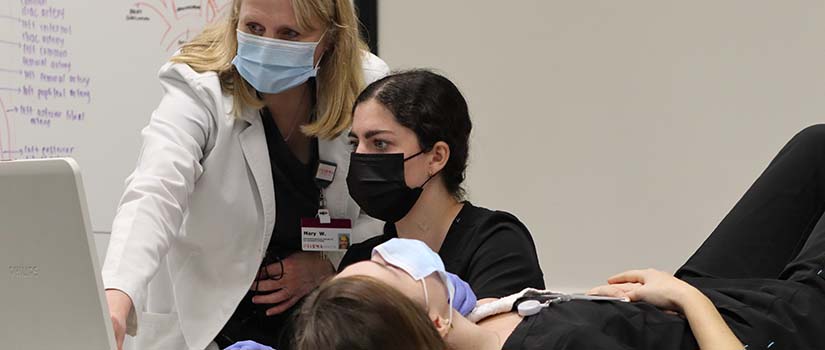Begin the program in the classroom, where you’ll study anatomy, human physiology, organic chemistry and physics to develop the skills you’ll need to assist physicians in evaluating, diagnosing and treating patients. Learn more about course requirements here.
The bachelor’s degree in cardiovascular technology includes an immersive 15–18 month externship at accredited clinical sites.
CVT Externships – Your Responsibilities and Resources
Externships areas of emphasis
What is it?
Cardiac echocardiography uses high-energy sound waves to visualize the structure and function of the heart. Noninvasive cardiovascular technologists work with physicians to help diagnose an enlarged heart, thickened or weakened heart muscle, problems with heart valves and the presence of blood clots or tumors.
Where is this training done?
- Harry T. Harper Jr. School of Cardiac and Vascular Technology, University Hospital, Augusta, Georgia (15-month program)
- Piedmont Technical College, Greenwood, South Carolina (15-month program)
- Cardiac and Vascular Institute of Ultrasound, Mobile, Alabama (12-month program)
- Hoffman Heart and Vascular Institute, St. Francis Hospital and Medical Center, Hartford, CT (12-month program)
What is it?
Vascular technology uses high-energy sound waves to evaluate blood flow and detect clots, blood vessel narrowing or loss of valve function in the arteries and veins in the neck, abdomen, arms and legs. Vascular technologists often work in close association with vascular surgeons and neurologists.
Where is this training done?
- Harry T. Harper Jr. School of Cardiac and Vascular Technology, University Hospital, Augusta, Georgia (15-month program)
- Cardiac and Vascular Institute of Ultrasound, Mobile, Alabama (12-month program)
What is it?
Combined cardiovascular technology includes training in cardiac echocardiography and vascular technology. Dual certification can provide greater job opportunities with higher pay.
Where is this training done?
- Claude W. Smith, M.D. School of Cardiovascular Technology at MUSC Health Columbia Medical Center, Columbia, South Carolina (17-month program)
- Prisma Health, Health Sciences Center, Greenville, SC, 18 months
What is it?
For invasive procedures, cardiovascular technologists work closely with cardiologists to insert catheters into patients’ arteries to diagnose and treat blockages that underlie certain heart problems. They can also assist in other types of cardiovascular surgery, such as implanting stents or cardiac pacemakers and using defibrillators to diagnose and treat certain heart disorders.
Where is this training done?
- Harry T. Harper Jr. School of Cardiac and Vascular Technology, University Hospital, Augusta, Georgia (15-month program)
- Piedmont Technical College, Greenwood, South Carolina (15-month program)
- Hoffman Heart and Vascular Institute, St. Francis and Medical Center, Hartford, CT (12-month program)
- Claude W. Smith, MD School of Cardiovascular Technology at MUSC Health Columbia Medical Center, Columbia, SC (17-month program)
Next steps
After you complete the comprehensive clinical training program, you’ll take the national registry examination in your specialty/specialties. Once you pass, you’ll be a licensed cardiovascular technologist/sonographer.
Because of the rigorous requirements for the acquisition of a fundamental scientific knowledge base and professional certification, students generally take four and a half years to complete the program. Students who have already completed a cardiovascular technology training program or internship are not eligible for the program.
Students who have already completed a cardiovascular technology CERTIFICATE OR TRAINING PROGRAM are not eligible for ENROLLMENT IN THE CVT MAJOR.
